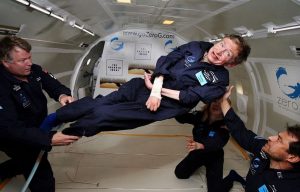Airport Benchmarking could not avoid to have a special though for a such special person….
A part of humanity brain has gone ….
Professor Stephen Hawking passed away in the early morning on March 14, 2018, when he was 76 years old. Celebrated for accomplishments in physics and popularizing scientific thinking, Hawking also worked on numerous other projects, including space travel.
The British theoretical physicist and cosmologist was acclaimed for his work with mathematician Roger Penrose on gravitational singularity theorems and the theoretical prediction that black holes emit radiation, now often called Hawking radiation.
Aside from his accomplishments in physics, Hawking also worked on numerous other projects, including space travel. Emphasizing the need for the human species to evolve into interplanetary species, Hawking devised a project to send tiny human spacecraft to Alpha Centauri. It is the second-closest star to Earth approximately 4.37 light years away.
The project Starshot Initiative, backed by Russian billionaire Yuri Milner and Facebook founder Mark Zuckerberg aims to build nanocraft that could travel at the fifth of speed light. In 2017 a number of project’s prototypes took flight becoming the smallest spacecraft ever flown.
The prototype “Sprites” was a tiny fully functional space probes of 3.5 cm by 3.5 cm built on a single circuit board successfully achieved Low Earth Orbit, Forbes reported. Eventually the nanocraft is planned to be scaled down to one centimeter which can use 10 gigawatt light beams to be propelled to speeds of up to 100 million miles per hour. If successful, the spacecraft could reach Alpha Centauri in 25 years after taking off.
When speaking about the project, Hawking noted that “such a system could reach Mars in less than an hour, reach Pluto in days, pass Voyager [the space probe launched in 1977] in under a week, and reach Alpha Centauri in just over 20 years,” the Independent reported.
Hawking has always emphasized the importance of space travel for humankind, speaking about the importance of interplanetary travel. According to the scientist, humankind has approximately a century left on Earth before it either evolves into interplanetary species, or seizes to exist. Hawking explained that the human species will eventually be wiped out by epidemics, climate change, asteroid strikes or overpopulation.
World renowned scientist
Hawking’s first major scientific breakthrough came in collaboration with Roger Penrose – they revealed that if the universe obeys the general theory of relativity, then it must have begun as a singularity , an infinitely dense point of space-time.
His most significant scientific breakthrough concerned studies in black holes. He was the first to show that black holes are not entirely black and in 1974 he presented his theory that black holes emit radiation, now known as Hawking radiation. While a controversial theory at the time, eventually after publication of further research it was accepted as a major breakthrough in the scientific community.
By the late 1970s Hawking was widely recognized as one of the great minds in modern science. In 1979 he was appointed as Lucasian Professor of Mathematics at University of Cambridge – one of the most prestigious academic posts in the world, formerly held by Isaac Newton and other great scientists. He held the post for 30 years. Throughout his life, the professor continued his research in black holes.
Throughout his career, the physicist was showered with numerous accolades including 13 honorary degrees and a plethora of awards and medals. In 1982 Hawking was awarded CBE and Companion of Honour seven years later. In 2009 professor was awarded with the Presidential Medal of Freedom the highest civilian award in the United States.
Despite numerous accolades, Hawking never received a Nobel Prize. Even though his discoveries were groundbreaking, theoretical scientific discoveries have to be confirmed by observational data before there’s a possibility of winning a Nobel. And black holes are nearly impossible to observe. In comparison, Einstein’s theory of gravitational waves in space, which were proposed back in the 1920s, was only proven in 2016.
Hawking was also known for his willingness to state controversial ideas which ranged from Artificial Intelligence (AI), time travel to how the world would end. Despite his outrageous predictions about the future, the professor was highly regarded as the one of the great minds of modern science.
The scientist expressed his fears about the future of AI, stating that it will be so advanced that it will replace humankind altogether. Not only would AI replace people in middle class jobs, potentially leaving millions without work, he also called for a ban on offensive autonomous weapons in an open letter by the science community including Elon Musk, Steve Wozniak and other notable persons.
Acclaimed author
While he was considered to be an accomplished scientist for years, Hawking’s worldwide fame came in 1988 when he released his popular science book on cosmology A Brief History of Time. The book explains complex scientific concepts for the general public. The book went on to be the most popular science book of all time as it was translated into 40 languages and sold more than 10 million copies. It was also jokingly dubbed “the most popular book never read”. The professor has written 15 books in his lifetime.
Hawking became one of the most recognizable scientists of all time, his cameos ranging from The Simpsons to Star Trek. His life was recently immortalized in a 2014 biographical film The Theory of Everything.
Numerous tributes have been outpouring from scientists, astronauts and celebrities noting his impact, sense of humor and intelligence throughout the day.
source : https://tinyurl.com/y7afl69j


